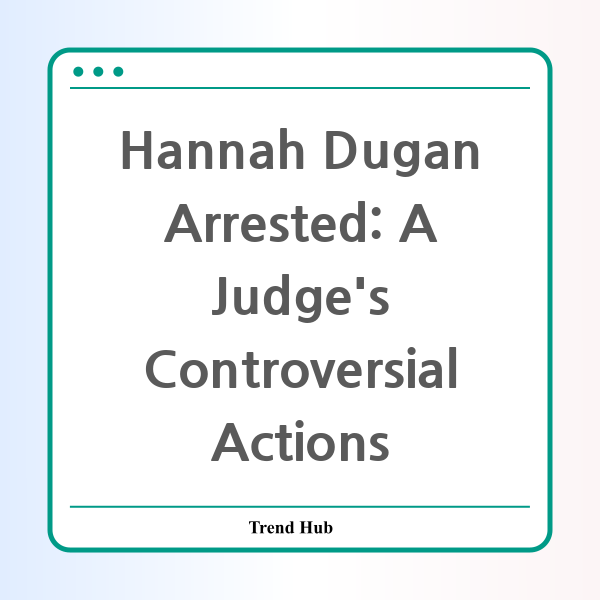* This website participates in the Amazon Affiliate Program and earns from qualifying purchases.

In a shocking turn of events that has captured the nation's attention, Milwaukee County Circuit Judge Hannah Dugan was arrested by federal authorities for allegedly obstructing an immigration enforcement operation. This incident raises critical questions not only about the actions of a sitting judge but also about the broader implications of such conduct in the legal community and society at large.
On April 25, 2025, the FBI confirmed that Judge Dugan was taken into custody at the Milwaukee County Courthouse. Charges against her stem from allegations that she aided an undocumented immigrant, Eduardo Flores Ruiz, in evading arrest while he was present in her courtroom for a pre-trial conference. The FBI's Director announced that Judge Dugan is accused of intentionally misdirecting federal agents attempting to apprehend Flores Ruiz, thus endangering public safety.
This incident is not the first that has brought federal immigration enforcement operations into focus within the judiciary. In recent months, immigration agents have made several attempts to execute arrests at the courthouse, highlighting a growing tension between state judicial procedures and federal enforcement actions. The question arises: how should judges balance their duties to uphold the law while also adhering to the humane treatment of individuals facing immigration issues?
According to reports, when federal agents arrived at the courthouse with an arrest warrant for Flores Ruiz, Judge Dugan allegedly directed him and his attorney to a side door, effectively allowing the defendant to evade capture. The judge, who was elected in 2016 and whose term is set to expire in 2028, reportedly declined to comment about the investigation when approached in her courtroom. This has further fueled public curiosity and debate about her actions.
Hannah Dugan's arrest is a stark reminder of the complexities involved in immigration law and the judiciary's role within that framework. As more individuals find themselves in the crosshairs of immigration enforcement, the judiciary must navigate a challenging landscape that balances legal responsibilities with ethical considerations. The implications of this case could resonate throughout the legal community, influencing how judges approach similar situations in the future.
This incident also underscores the importance of transparency in the legal system. As federal authorities pursue investigations into conduct that may undermine the enforcement of immigration laws, the public deserves clarity about the legal and ethical obligations of judges. The outcome of this case will likely set a significant precedent for how similar cases are viewed in the future.
As the legal proceedings unfold, many are left wondering about the ramifications for Judge Dugan's career and the potential legal reforms that might arise from this situation. The balance between law, justice, and social responsibility remains a dynamic and contentious debate, and this incident may very well serve as a pivotal point of discussion in the ongoing dialogue about immigration in the United States.
In conclusion, the arrest of Judge Hannah Dugan highlights the intricate interplay of law and ethics within the realm of immigration enforcement. As updates continue to emerge, it is essential for the public to remain informed and engaged in this critical issue that affects thousands across the country.
* This website participates in the Amazon Affiliate Program and earns from qualifying purchases.